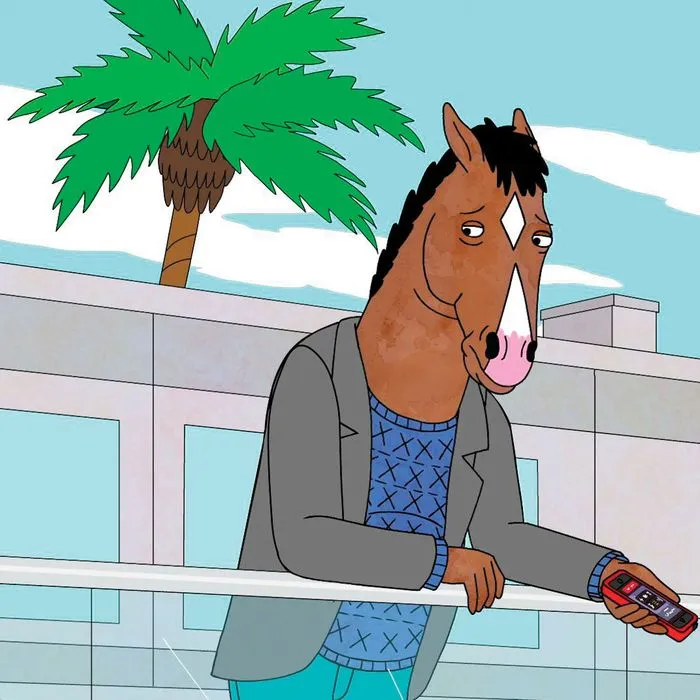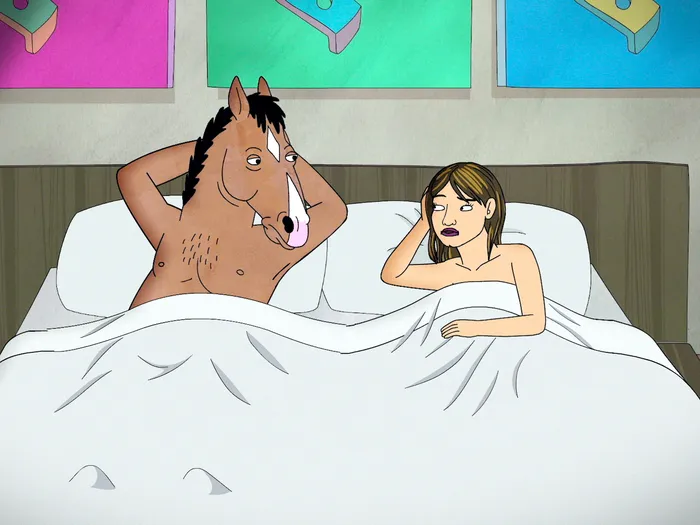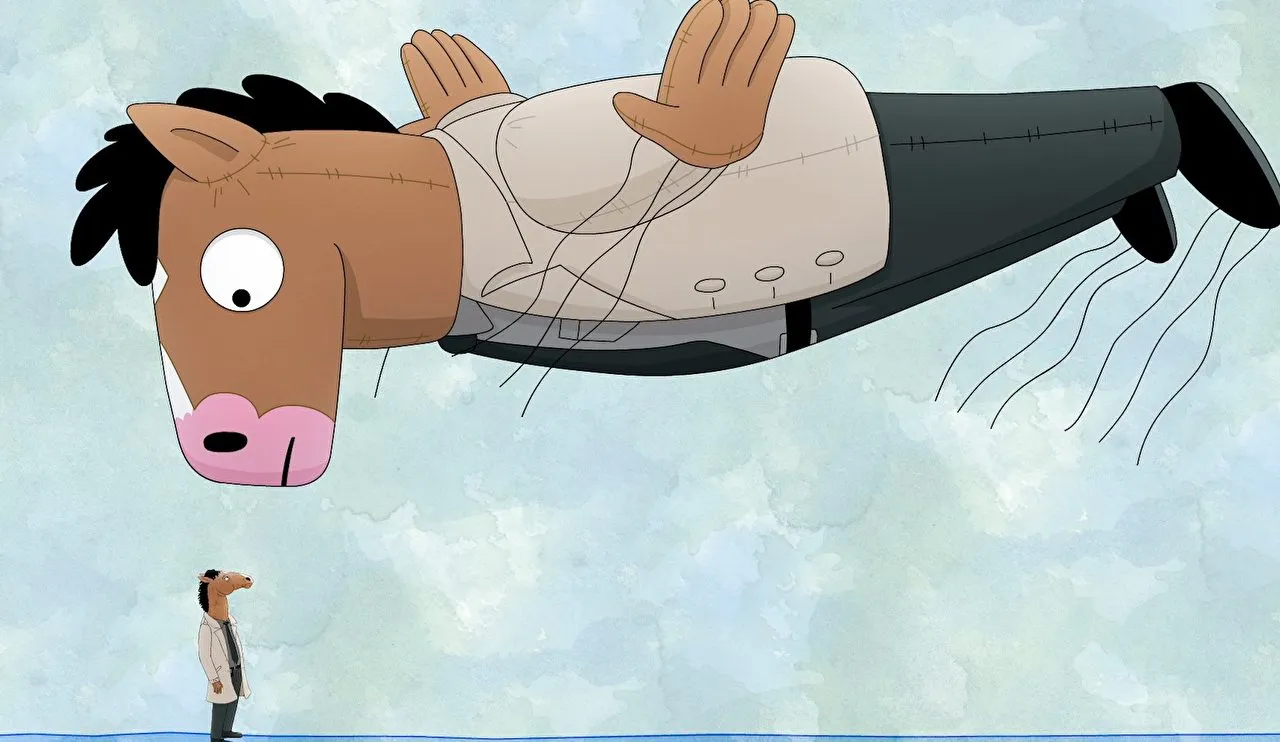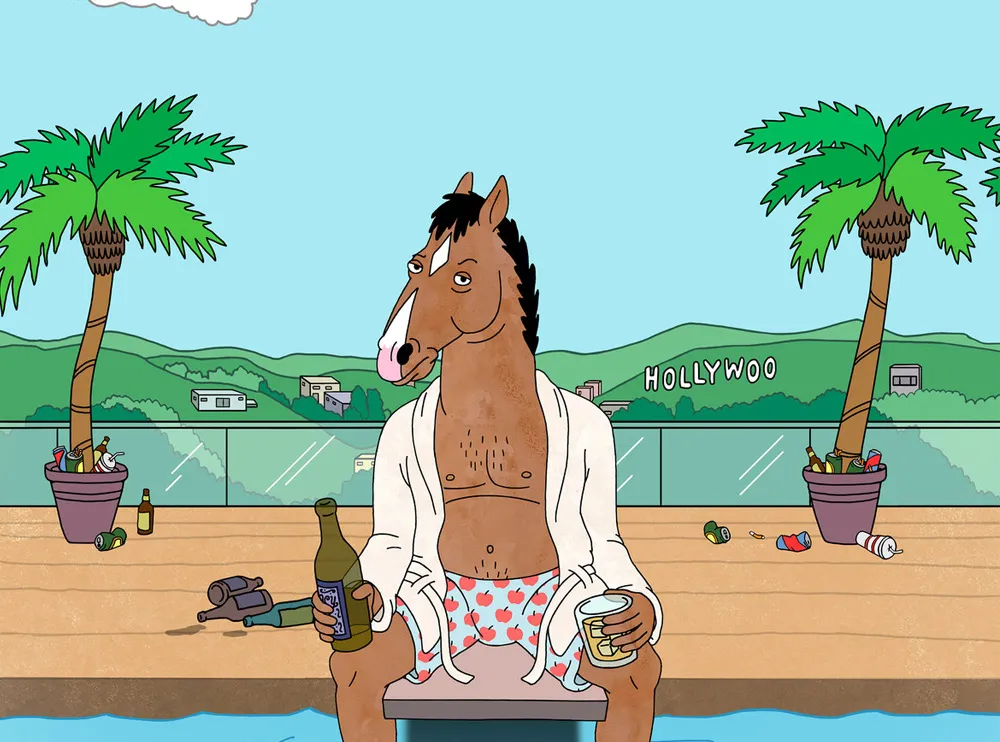
Bojack Horseman is an animated series that at first glance seems a trivial, light hearted look at the vacuous lifestyles of Hollywood's glitterati, a nod to the self-serving merry-go-round that is the epicentre of the global film industry. However a deeper look at the show reveals some subtle and also some not so subtle explorations into happiness and life it self.
Bojack is a nihilistic horse-man who can only experience the world through his perception of the adulation he is or isn't receiving. Yet this constant grabbing and cloying for attention only ends up making him feel more alone and miserable, as he slides from one existential crisis to another.
The show asks the big questions; why are we here? What is the purpose of life? And What does it mean to be happy? All of these questions are posed through the Kafkaesque setting of an imagined Hollywood and juxtaposed by side-splitting comedy, delivered in a way that a program with real life actors could never quite deliver. Or if indeed a real life show tried to convey the same message, the ensuing feelings of maudlin would be too much for any viewer to bear. Or at least viewers whom weren't already acquainted with the writings of Franz Kafka.
So, let us explore how an animated comedy set in a bizarre universe of talking animals and interspecies romantic relationships, manages to tackle the kind of subjects that fourth year philosophy students and professors alike, spend many hours of hand-wringing introspection on.
If you haven't seen the show, then spoiler alert I will be discussing some of the plot lines and outcomes.
A Colourful Past
Animation or cartoons, depending on your standpoint are either sophisticated ways of tackling otherwise difficult subject matters, or lightweight childish fodder that sometimes holds the adult attention for a second or two.
These days you are much more likely to fall into the cartoons are for kids silo than you are to take them as a serious medium.
Thanks to Walt Disney and his cohorts of animators, Western society and beyond has had the firm belief that cartoons are indeed for children, seeing as the most popular and frequent animations are aimed at an age group that hasn't stopped wetting the bed yet.
However if we look at the history of cartoons, we actually find that the earliest animations were aimed at an adult audience, in fact children weren't even seen as a viable demographic in the early days of cinema and television. Why the hell would you worry about what kids want to watch? Surely it is their parents who are suffering the daily grind of handling full time employment coupled with the enormous responsibility of taking care of aforementioned kids.
The first film to use animation was made in 1900 and was called The Enchanted Drawing. The short piece used a mixture of mainly live action and some interesting stop motion animation. Whereby a man draws things on a piece of paper and they came to life. He treats his audience to the sight of a man he drew, drinking wine and smoking a cigar, then pulling those items from the page to himself enjoy a drink and a smoke. It is clear from watching The Enchanted Drawing that the last people the filmmaker had in mind whilst filming were children.
Fast forward a few decades and examples, and we come to characters that are more familiar to a lot of adults and children today. Ones such as Mickey Mouse and Porky Big, Buggs Bunny and Daffy Duck. However these early characters were also based in films aimed at an adult audience, indeed characters like Buggs Bunny were used in wartime Allied propaganda films during World War Two. Back then it would not have been odd to see Buggs Bunny saying racial slurs or a 1942 version of Daffy Duck essentially play Adolf Hitler.
Even at its origins animation has always been used to address issues that would be otherwise to delicate to approach, and this is what Bojack Horseman does with such daring and amazing skill.
Love

The first big subject the series deals with is love in its many forms. From the plastic shiny love adoring fans give to their favourite celebrities, to the bonding love of friendship and sexual relationships, right through to the kind of love or the kind that might develop professionally.
In the first instance Bojack Horseman lives at the centre of a dichotomy that is tearing his very being apart. Unloved as a child by a resentful alcoholic father and a drug addled heiress to a sugar fortune, Horseman seeks the meaning of love in first his audience for his 90s sitcom, and then in its residual fans, a celebrity-obsessed public, and a fickle Hollywood media.
Horseman is tortured by the fact that he hates the people who make him who he is, he resents them for loving him because he realises their love is based on an unrealistic portrayal of an apple-pie character that doesn't exist. He is often caught trying to justify their love by reasoning that sitcoms make people feel good about themselves and therefore he is playing an important societal role. Unfortunately for our hero those moments are fleeting and Horseman is often left staring back at himself wondering who he is. This is wonderfully portrayed when he has a near-death experience and hallucinates a special dinner taking place for him and he is forced into a nightmare of introspection as he examines how he has affected the lives of those closest to him.
Any interaction Bojack Horsemans has with fans or just members of the public whom happen to know who he is, tends to drive him further into the pit of self-loathing. In a scene in a bar when Horseman is drowning his sorrows because his warts-and-all ghost-written book is a smash hit, he approaches a small group of millennials who have been taking pictures of the whole affair and posting them on Instagram. At first Horseman is angry and tries to play the celebrities are just people too card, but ends up taking one of them home and sleeping with her.
The scene in bed the morning after serves to illustrate just how far he is from the world of the young "fan", her world of social media hits and likes is as alien to him as the 90s is to her. We see the fan tweeting and blogging about the experience. Because of the encounter Horseman ends up hating himself just a little more and we hear him wonder what the point of anything is. Unfortunately Bojack doesn't see the irony in their meeting, as the millennial is trying to achieve her own level of justification and fulfilment through social media.
Perhaps Horseman's most complex relationship is with his former child co-star Sarah Lynn, who bears more than a passing resemblance to Britney Spears.
Like Spears Lynn was the cute child star of a popular TV show, later becoming a popstar flaunting the very sexuality the media were dying to bring out of her prematurely. Her relationship with Horseman is complicated not least because he used to play her adoptive father on the show. Seeing as she was just a child during the show and her own parents were too caught up in their little baby being a star.
Unfortunately for Sarah Lynn Bojack was only a father figure in the space between the words action and cut. Offscreen he was an inappropriate influence on her life, introducing her to alcohol and prescription drugs, whilst filling her with bad advice.
At one point, during a month-long drug bender with the then adult Sarah Lynn, Horseman opines that they should be the best of friends because they knew each other before all the fame and adulation. In truth, the reason they're abusing drugs together in the first place is because Horseman gets nominated for an Oscar only to be told that the nomination was an accident. This sends him into a tailspin as he had pinned any residual feelings of self-worth to the winning of the award.
When he finds out it was all a big mistake, he calls up the nine-month-sober Sarah Lynn and asks if she wants 'to party'. This partying leads to some of the funniest, yet deep scenes of the entire eight season show. Horseman keeps blacking out mid-sentence and finding himself in a completely different reality. At one point he returns to Anna, his former publicist's house to confront her about why she ditched him. Anna begins to tell him a story of being a lifeguard in which he keeps blacking out at the beginning and finding himself driving away from her house. At one point he apologises for returning over and over on the same night asking her to repeat her story, whereby Anna informs Bojack that he has not been there for two weeks.
That particular scene is a perfect example of the genius of Bojack Horseman, in the fact that the show can tackle potentially depressing subjects such as a washed-out, nihilistic, alcoholic, actor destroying all those around him by his own self-destroying narcissism, and make it funny, very funny in fact.
This is not to say it does not have it's own truly depressing moments, the month-long bender ends with Sarah-Lynn overdosing on heroin named after Bojack, just as he is realising that being happy is not dependent on anything mattering.
The Meaning Of Everything

At it's heart there is a constant questioning; How can I be happy if life is meaningless? and it is not only Horseman who has to wrestle with this dilemma, yes we see him agonise over whether an Oscar will make him happy, but also his agent, Princess Carolyn (the cat) and his best-friend-come-nemesis Mr Peanut Butter (the dog) also deal with this existential question in their own ways.
Bojack's sometime lover and long-time agent, Princess Caroly,n struggles with the pointlessness of her work as a Hollywoo (the D was stolen) agent, however like Sisyphus she starts to enjoy rolling the rock up the hill over and over again. She understands the futility of her work, knows it's utterly meaningless, but she doesn't let that stop her from enjoying it.
Mr Peanut Butter tells his wife and ghost-writer of Bojack's book, Diane, that the secret to avoiding the contemplation of one's own existence, is to fill your life with constant distraction until you die. Rather than be depressed about this Mr Peanut Butter is happy knowing that he can derive meaning simply by doing things. Whether those things are working in a Foot Locker selling shoes, or buying hundreds of thousands of spaghetti strainers for a not-thought-of-yet business.
Diane is perhaps the one that I personally relate to the most. She is not a star, Diane is simply trying to be a writer, preferably of something deep and meaningful which will hopefully change something either within or herself or on some grander scale. She is constantly trying to find a deeper meaning to her existence through her work, but inevitably ends up getting jobs writing celebrity tweets or best-of lists on websites called Girl Croosh.
When Diane finally gets a chance to do something and change the world, she finds herself travelling to the fictional war-torn country of Cordovia to help struggling refugees, teaming up with the dashing Sebastian St. Clair. However Diane finds out that helping people is not all what it seemed as St. Clair seems to be more concerned with how he will be perceived and clearly finds meaning in his own life by being thought of as a hero.
In the end Diane comes back to Hollywoo and rather than go home to her husband Mr Peanut Butter, she goes and stays in Bojack's mansion, drinking herself to oblivion by the pool day after day.
Depressing Or Funny?

If you've never seen the show then after reading the above you'd be forgiven for thinking that Bojack Horseman was one of the most depressing TV shows ever written. However it some how manages to not be that, it achieves some moments of absolute pure comedy gold. The amount of times I've had to pause and rewind because I was laughing so hard, often in the same episode, is uncountable.
There's a school of thought that says we humans evolved and developed comedy as a way of dealing with tragedy. Some of the most lauded comedians of all time were at their best when talking about the ills of society. From Richard Pryor to Robin Williams (Live At The Met), to George Carlin and Mr Synical himself, Bill Hicks. It seems we just can't get enough of people being funny about things that are ultimately depressing. Whether it's corrupt politicians, crazy fringe group movements, drug addiction, or just how shitty life can be in general, we love to laugh at those things.
So does Bojack Horseman fall into that category, or is it one, or rather several, steps too far?
I like what creator Raphael Bob-Waksberg says about the show;
“[...]that was kind of the tone I was going for early on with BoJack because I want (sic.) it to feel like a sad episode of The Simpsons. I think what’s so great about those episodes in particular is they don’t sacrifice jokes for emotion – they are very funny and full of great gags, but they are also very moving as well and very melancholy.”
That sums it up beautifully for me, things like suicide, drug addiction, sexual harassment, death, dementia, abortion and a whole lot more, are hard to deal with and often too difficult to contemplate because they are so real and create such visceral feelings within us.
Using the absurd as a tool, a cartoon in a universe whereby animals talk and are largely bi-pedal, yet still keep pets, is perhaps the perfect way to help us deal with difficult subjects.
So if you do decide to watch Bojack Horseman, know that the show is packed full of great gags of all different kinds and some genuinely laugh-out-loud funny moments, but that you will also be moved on another much sadder level.
Cryptogee
